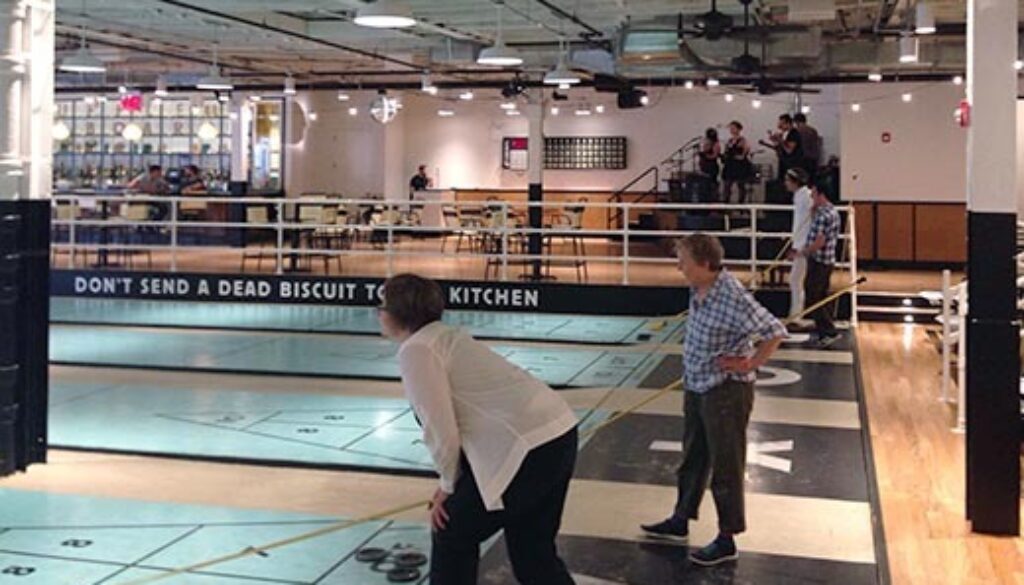A Changing Brooklyn: Gowanus
(This was originally featured on the Columbia School of Journalism class site The Brooklyn Ink on August 6, 2014)
The Royal Palms Shuffleboard Club is one example of new investment in the old industrial neighborhood of Gowanus.

(Early bird customers play shuffleboard while the band warms up for Friday night festivities. Photo: Amanda-Rae Prescott/The Brooklyn Ink)
Mambo beats fill the air as groups of people strategize their next moves on the shuffleboard court. The décor symbolizes the highlights of a vacation in Florida. Team members motion to each other which spaces on the shuffleboard triangle opposite are free. Some push their biscuits (shuffleboard disks) across the room, while others skip the courts completely for friendly conversation with the bartender. This game of childhood or the senior center is now a game for nostalgic trendsetters on a Friday night.
Playing shuffleboard in Gowanus is one of many examples of the trend away from the neighborhood’s past in heavy industry towards a future of stores, residential development, and entertainment, some on the quirky side. Royal Palms Shuffleboard Club opened in February 2014, but the story of began in December 2011.
The owners, Ashley Benson and Jonathan Schnapp, were inspired after visiting The Mirror Lake Club in St. Petersburg, Fl. Benson saw young people gathered in a massive crowd around the courts for parties and good-natured competition. Benson and Schnapp believed New Yorkers would want to play shuffleboard too.
“Neither one of us raised money before. We tried to convince any one with $50,000 to spare to invest,” Benson said. Both poured into the business their entire life’s savings, completely convinced this idea would work.
Benson and Schnapp looked at more than ten locations elsewhere in the city before they found 514 Union Street. The other locations were either too expensive or too small for the amount of space shuffleboard courts require. The building 514 Union Street was right in terms of price and of the space. Benson and Schnapp signed the lease in July 2012. The building used to be a die-cutting facility for producing direct mail inserts. During the 1920’s to the 40’s, it was a Coca Cola bottling plant. The current owner had moved his die cutting operations to New Jersey. Schnapp said the lease was at a much lower price than today’s current market value.
“Gowanus was so underdeveloped, so few places in New York have 7,000 square feet available,” Schnapp said. “It’s also close to several great neighborhoods, which gives the area a sense of community.”
The story of change in Gowanus began with the NYC Department of City Planning study of the Gowanus Canal corridor in the mid 2000’s. The study reveals the City took an active role in encouraging conversion of abandoned or unused industrial space into residences and new businesses.
According to the Land Use Map for Community District 6, more than 50 percent of the total space in Gowanus is allocated for industrial use. However, as heavy industry moves out, business and home development move in. In July 2007, the Department of City Planning and the Community Board 6 presented to the public their framework for developments along the canal. The goals for future projects along the canal were: public access to the waterfront, mixed industrial/commercial and residential development, environmental cleanup, affordable housing, and constructive land use. Along with those goals were zoning maps and limits on building heights. The areas closest to the canal also included plans for building walkways for the public to access the canal.
The business plan for Royal Palms reflected some of these larger goals of the Department of City Planning. Benson and Schnapp proposed to construct ten side-by-side shuffleboard courts. In addition to the courts, they planned to have two bars as well as a stage for bands or DJ’s to play. The floor plan is set up so that the space can be divided in half to allow general public admission as well as private party rentals. A delivery bay on the far right side of the building will allow food trucks to park and serve guests.

(The front desk of Royal Palms features a wall of childhood board games. Photo: Amanda-Rae Prescott/The Brooklyn Ink)
“Our mission statement is Fun,” Schnapp said.
City officials approved their plans, and after that Benson and Schnapp moved forward with construction and licensing. The road to opening day was filled with obstacles. Plumbing and other structural issues in the space needed to be addressed. Benson said the City officials she talked to believed the Royal Palms proposal was one of the best presented. However, there was considerable pushback from the neighborhood.
“I was devastated the community’s reaction was so negative,” Benson said. The goal of Royal Palms was to become a new community gathering space, but many believed the shuffleboard operation was going to be another loud nightclub or bar. Opponents presented these concerns at Community Board and liquor license approval meetings. Convincing residents in a door-to-door campaign to support the business was a slower process than Schnapp and Benson expected. The owners had to convince the community their goal was to create a new community gathering space and not another rowdy bar. Eventually 1,000 signatures were collected in support of the liquor license.
Royal Palms officially opened on February 19th, 2014. Benson said some neighbors who were initially resistant to the opening were impressed with the end results. Indeed, people who lived and worked nearby gathered to play shuffleboard. Some residents and businesses formed league teams to participate in competitions on Monday and Tuesday nights. The staff team from Dinosaur Barbecue, a restaurant on the next block from Royal Palms, won the league championships last month. All of the team plaques and their positions are posted on a wall to the right of the entrance. Other residents prefer visiting on the weekend or stopping by after work for drinks. Schnapp said he makes it a point to patronize the neighboring restaurants and bars, to give back to Gowanus.
The future of Royal Palms is open ended. Benson and Schnapp have received several offers and proposals for expanding the Royal Palms concept to expand to other cities. But at this time their focus is keeping the existing business going.
“In a year, what’s important is that the place still feels special and fun,” Schnapp said.



